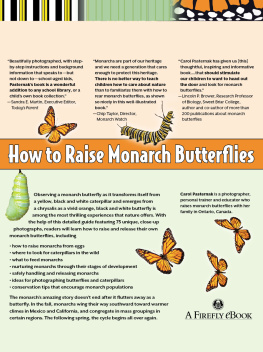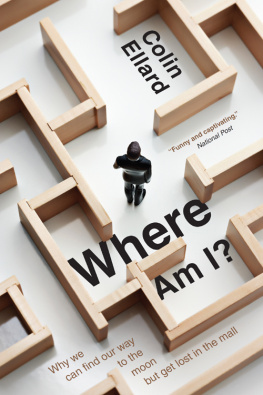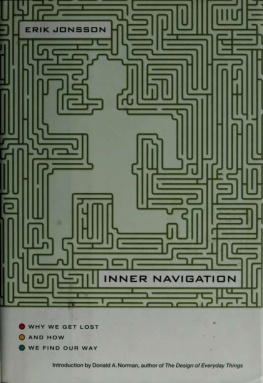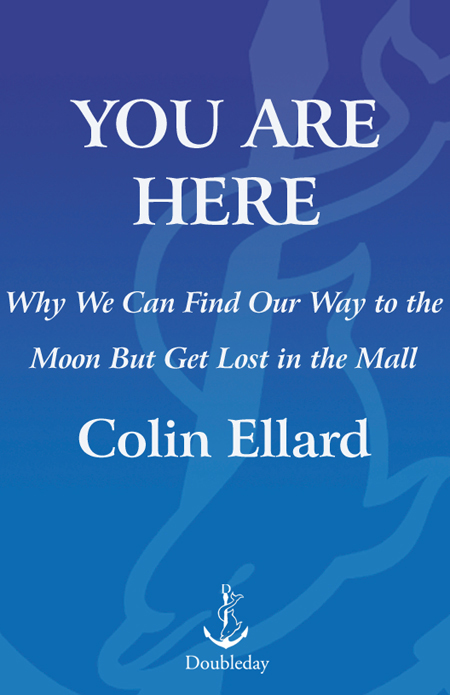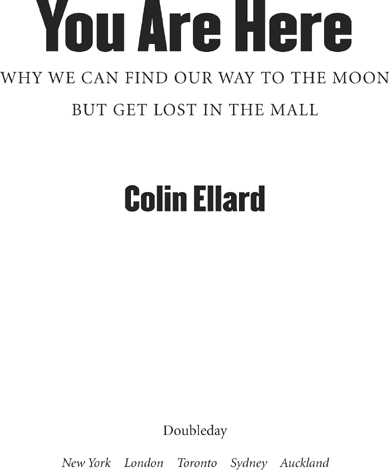Colin Ellard - You Are Here: Why We Can Find Our Way to the Moon, but Get Lost in the Mall
Here you can read online Colin Ellard - You Are Here: Why We Can Find Our Way to the Moon, but Get Lost in the Mall full text of the book (entire story) in english for free. Download pdf and epub, get meaning, cover and reviews about this ebook. year: 2009, publisher: Doubleday, genre: Romance novel. Description of the work, (preface) as well as reviews are available. Best literature library LitArk.com created for fans of good reading and offers a wide selection of genres:
Romance novel
Science fiction
Adventure
Detective
Science
History
Home and family
Prose
Art
Politics
Computer
Non-fiction
Religion
Business
Children
Humor
Choose a favorite category and find really read worthwhile books. Enjoy immersion in the world of imagination, feel the emotions of the characters or learn something new for yourself, make an fascinating discovery.

- Book:You Are Here: Why We Can Find Our Way to the Moon, but Get Lost in the Mall
- Author:
- Publisher:Doubleday
- Genre:
- Year:2009
- Rating:4 / 5
- Favourites:Add to favourites
- Your mark:
You Are Here: Why We Can Find Our Way to the Moon, but Get Lost in the Mall: summary, description and annotation
We offer to read an annotation, description, summary or preface (depends on what the author of the book "You Are Here: Why We Can Find Our Way to the Moon, but Get Lost in the Mall" wrote himself). If you haven't found the necessary information about the book — write in the comments, we will try to find it.
A fascinating exploration of human navigation, both feat and foible, in the age of GPS and GoogleEarth.
We live in a world crowded by street signs and arrows. With the click of a computer mouse we can find exact directions to just about anywhere on earth, and with a handheld GPS we can find our precise latitude and longitude, even in the remotest of places. But despite all our advancements, we still get lost in the mall, cant follow directions to a friends house and, on camping expeditions, take wrong turns that can mean the difference between life and death.
Many other species, however, have an innate sense of direction. Ants display surprisingly sophisticated behavior, traveling great distances without wasting a step. Monarch butterflies and migrating songbirds pilot even greater expanses, thousands of kilometers in some instances, to targets that they might never even have seen before. A homing pigeon can be driven halfway across a continent in a lightproof box and then, on release, find its wayunerringlyback to its loft. What is truly amazing, though, is that humans, the only animal that has come close to understanding how some of these magnificent navigational feats are performed, are rendered helpless by dense bush or even an unexpected turn in a maze of cubicles.
In You Are Here, psychologist Colin Ellard explains how, over centuries of innovation, we have lost our instinctive ability to find our way, as we traverse vast distances in mere hours in luxurious comfort. Some cultures, such as the Inuit, retain the ability to navigate huge expanses of seemingly empty space, as their survival depends on it, but the rest of us have been so conditioned by our built-up world that we dont really know how to get from point A to point B.
Drawing on his exhaustive research, Ellard illuminates this disconnect from our world with great clarity and explains what it means, not just for our forays into the wilderness but for how we construct our cities, our workplaces, and even our homes and virtual worlds. Architects and city planners, he suggests, need to consider human behavior when designing human environments, and we all need to recognize that we are part of, not isolated from, the space around us.
Colin Ellard on You Ar
Colin Ellard: author's other books
Who wrote You Are Here: Why We Can Find Our Way to the Moon, but Get Lost in the Mall? Find out the surname, the name of the author of the book and a list of all author's works by series.

